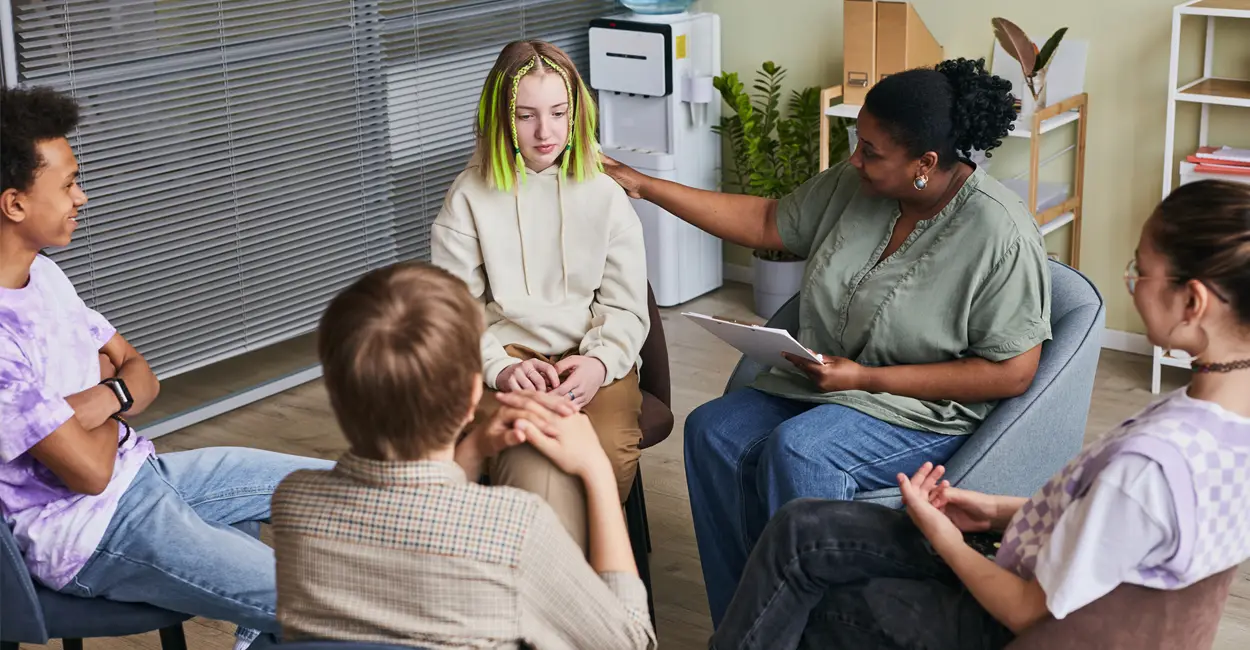24/7 Helpline:
(866) 899-221924/7 Helpline:
(866) 899-2219
Learn more about PTSD Rehab centers in Stevenson
PTSD Rehab in Other Cities

Other Insurance Options

Meritain

Carleon

Optima

Coventry Health Care

WellCare Health Plans

BlueCross

Amerigroup

Private insurance

Horizon Healthcare Service

Ceridian

UnitedHealth Group

BHS | Behavioral Health Systems

Molina Healthcare

Evernorth

Providence

Magellan

Health Net

Multiplan

Access to Recovery (ATR) Voucher

Humana


BHG Stevenson Treatment Center
BHG Stevenson Treatment Center, located in Stevenson, Alabama, is an alcohol and drug rehab program ...



Family Life Center
Located in Scottsboro, Alabama, Family Life Center is a non-profit alcohol and drug rehab and addict...

Liberation Programs
Liberation Programs stands as a reputable behavioral health treatment center in Bridgeport, CT. It p...

Recovery Network of Programs – Treatment Center
Recovery Network of Programs – Treatment Center is a private rehab located in Bridgeport, Connecticu...

New Prospects
New Prospects is a private rehab located in Bridgeport, Connecticut. New Prospects specializes in th...

New Era Rehabilitation Center
New Era Rehabilitation Center (NERC) is a CARF-accredited substance abuse treatment rehab in Bridgep...

Recovery Counseling Services
Recovery Counseling Services is a private rehab located in Bridgeport, Connecticut. Recovery Counsel...

CASA – Casa Eugenio Maria de Hostos
CASA - Casa Eugenio Maria de Hostos offers inpatient and outpatient treatment for individuals with a...

MCCA – Midwestern Connecticut Council on Alcoholism
Midwestern Connecticut Council on Alcoholism (MCCA) is non-profit organization dedicated on helping ...

CASA – Project Courage
CASA Project Courage stands as a CARF-accredited addiction treatment rehab in Bridgeport, CT offerin...

Recovery Network of Programs
Recovery Network of Programs, in Bridgeport, Connecticut, is an outpatient drug and alcohol rehab fo...

Connecticut Renaissance – Main Street
Connecticut Renaissance - Main Street is an outpatient facility that offers treatment for individual...

Southwest Community Health Center – Albion Street
Southwest Community Health Center - Albion Street offers alcohol and drug rehab services and mental ...

Recovery Empowerment Counseling Center
Recovery Empowerment Counseling Center offers outpatient and intensive outpatient treatment for indi...

Southwest Connecticut Mental Health System
Southwest Connecticut Mental Health System is a public rehab located in Bridgeport, Connecticut. Sou...

Recovery First
Recovery First, situated in Hollywood, FL, stands as a dedicated drug and alcohol addiction treatmen...

United Recovery Project
United Recovery Project is an accredited luxury dual-diagnosis addiction rehab in Hollywood, FL. The...

JC’s Recovery Center
JC’s Recovery Center provides faith-based drug and alcohol addiction rehab in South Florida. Their s...

Henderson Behavioral Health – South Branch
Henderson Behavioral Health - South Branch is one of the oldest, largest and most successful provide...

Memorial Regional Hospital – Behavioral Health
Memorial Regional Hospital is a dual diagnosis rehab facility located in Davie, FL providing drug an...

Action Relational Therapy of Florida
Action Relational Therapy of Florida is a private rehab located in Hollywood, Florida. Action Relati...

Memorial Regional Hospital – Outpatient
The Memorial Regional Hospital (MRH) in Hollywood, Florida, is a clinical alcohol and drug treatment...

Compassion Behavioral Health
Compassion Behavioral Health (CBH) is a top-rated nationally accredited Mental Health and Addiction ...

New Season – Broward Treatment Center
New Season - Broward Treatment Center is a private rehab located in Hollywood, FL. New Season - Brow...

Pathways – 44065 Airport View Drive
Pathways - 44065 Airport View Drive offers outpatient services for individuals with mental health di...

Pathways – 44101 Airport View Drive
Pathways - 44101 Airport View Drive offers outpatient services for individuals with mental health di...

Counseling Services
Counseling Services is a private rehab located in Hollywood, Maryland. Counseling Services specializ...

Freedom Center
Freedom Center is a substance abuse and addiction treatment rehab in Princeton, MN. Freedom Center i...

Partners in Recovery – Project Free
Partners in Recovery – Project Free is a private rehab located in Trenton, New Jersey. Partners in R...

New Horizon Treatment Services
New Horizon Treatment Services is a private rehab located in Trenton, New Jersey. New Horizon Treatm...

Greater Trenton Step Program
Greater Trenton Step Program is a private rehab located in Trenton, New Jersey. Greater Trenton Step...

Diocese of Trenton – Partners in Recovery
Diocese of Trenton – Partners in Recovery is a non-profit rehab located in Trenton, New Jersey. Dioc...

Hamilton Treatment Services
Hamilton Treatment Services is a private rehab located in Trenton, New Jersey. Hamilton Treatment Se...

Princeton House Behavioral Health
For more than 50 years, Princeton House Behavioral Health's addiction treatment center has been prov...

Oaks Integrated Care
Oaks Integrated Care is a non-profit organization dedicated to provide behavioral health services fo...

Lake House Academy
Lake House Academy is a private rehab located in Flat Rock, North Carolina. Lake House Academy speci...

Carey Counseling Center
Carey Counseling Center is a private rehab located in Trenton, Tennessee. Carey Counseling Center sp...

Serenity View Recovery Center
Serenity View Recovery Center, formerly known as Sunspire Health Serenity View Recovery Center, prov...

Cypress Lakes Lodge
Cypress Lakes Lodge is a CARF accredited dual diagnosis drug and alcohol addiction treatment center ...

United Hospital Center – Behavioral Health
United Hospital Center–Behavioral Health is an inpatient mental health and dual diagnosis care cente...

Southern Highlands Community Mental Health Center – LEGENDS
Southern Highlands Community Mental Health Center (SHCMHC) is a comprehensive dual diagnosis mental ...

Southern Highlands Community Mental Health Center
Southern Highlands Community Mental Health Center offers outpatient services, OBMAT, DUI classes, AC...































Mountain Lakes Behavioral Healthcare – Dutton Homes
Mountain Lakes Behavioral Healthcare - Dutton Homes is a residential program for individuals from Ja...

Mountain Lakes Behavioral Healthcare
Located in Scottsboro, Alabama, Mountain Lakes Behavioral Healthcare offers mental health and alcoho...

Mountain Lakes Behavioral Healthcare – Jackson Place
Mountain Lakes Behavioral Healthcare - Jackson Place offers alcohol and drug rehab programming to me...

The Pointe Outpatient Behavioral Health Services – Bryant
The Pointe Outpatient Behavioral Health Services – Bryant is a private rehab located in Bryant, Arka...

Boys and Girls Village
Boys and Girls Village is a private rehab located in Bridgeport, Connecticut. Boys and Girls Village...

LifeBridge Community Services
LifeBridge Community Services is a private rehab located in Bridgeport, Connecticut. LifeBridge Comm...

Southwest Connecticut Mental Health Systems
Southwest Connecticut Mental Health Systems is a public rehab located in Bridgeport, Connecticut. So...

Saint Vincents Behavioral Health Services
Saint Vincents Behavioral Health Services is a private rehab located in Bridgeport, Connecticut. Sai...

The Connection – Women’s Recovery Support Program
The Connection – Women’s Recovery Support Program is a private rehab located in Bridgeport, Connecti...

Connecticut Renaissance – Lafayette Circle
Connecticut Renaissance - Lafayette Circle is an outpatient facility that offers treatment for indiv...

Associates for Psychological Services
Associates for Psychological Services is a private rehab located in Hollywood, Florida. Associates f...

Advanced Addiction Treatment
Advanced Addiction Treatment is a private rehab located in Hollywood, Florida. Advanced Addiction Tr...

Citrus Health Network – Center for Adolescent Treatment
Citrus Health Network – Center for Adolescent Treatment is a private rehab located in Hollywood, Flo...

Susan B. Anthony Recovery Center
Susan B. Anthony Recovery Center is a private rehab located in Hollywood, Florida. Susan B. Anthony ...

Allied Therapy Services
Allied Therapy Services is a private rehab located in Hollywood, Florida. Allied Therapy Services sp...

West Psychiatric Associates
West Psychiatric Associates is a private rehab located in Hollywood, Florida. West Psychiatric Assoc...

Gulf Coast Jewish Family & Community Services
Gulf Coast Jewish Family & Community Services is a private rehab located in Hollywood, Florida. Gulf...

Advanced Addiction Treatment Center – Pines Boulevard
Advanced Addiction Treatment Center – Pines Boulevard is a private rehab located in Hollywood, Flori...

Broward County – Substance Abuse
Broward County – Substance Abuse is a private rehab located in Hollywood, Florida. Broward County – ...

Heel to Toe IoniCleanse – Detox
Heel to Toe IoniCleanse Detox is a private rehab located in Hollywood, FL. Heel to Toe IoniCleanse D...

Recovery In The Light
Recovery In The Light is a rehab located in Hollywood, Florida. Recovery In The Light specializes in...

Amended Recovery House
Amended Recovery House is a private rehab located in Hollywood, Florida. Amended Recovery House spec...

Aloha House
Aloha House is a private rehab located in Hollywood, Florida. Aloha House specializes in the treatme...

North Central Behavioral Health Systems
North Central Behavioral Health Systems offers outpatient services for individuals with alcohol and/...

New Directions Counseling
New Directions Counseling is a private rehab located in Princeton, Illinois. New Directions Counseli...

Southwestern Behavioral Healthcare – Gibson Regional Services
Southwestern Behavioral Healthcare - Gibson Regional Services offers outpatient services for those r...

WKDA Counseling Services
WKDA Counseling Services specialized in anger management, DUI programs and alcohol and drug therapy....

Region XI Southwest MS – Mental Health Center
Region XI Southwest MS – Mental Health Center is a private rehab located in Woodville, Mississippi. ...

Preferred Family Healthcare
Preferred Family Healthcare offers a residential and outpatient program, day treatment, detox, and C...

North Central Missouri Mental Health Center
North Central Missouri Mental Health Center serves the nine counties of the Green Hills area. They p...

Behavioral Healthcare – Outpatient
Behavioral Healthcare – Outpatient is a private rehab located in Trenton, New Jersey. Behavioral Hea...

South Broad Street Counseling Services
South Broad Street Counseling Services is a private rehab located in Trenton, New Jersey. South Broa...

Trinity Counseling Service
Trinity Counseling Service is a private rehab located in Princeton, New Jersey. Trinity Counseling S...

Princeton Addiction Counseling
Princeton Addiction Counseling is a private rehab located in Princeton, New Jersey. Princeton Addict...

Army Substance Abuse Program – ASAP
Army Substance Abuse Program – ASAP is a private rehab located in Trenton, New Jersey. Army Substanc...

Family Guidance Center – Behavioral Healthcare Services
Family Guidance Center - Behavioral Healthcare Services provides outpatient mental health, substance...

Association for Advancement
Association for Advancement is a private rehab located in Princeton, New Jersey. Association for Adv...

Al An Club
Al-An Club is a non-profit community-based rehab located in Trenton, New Jersey. Al-An Club organize...

Family Guidance Center – Substance Abuse
Family Guidance Center – Substance Abuse is a private rehab located in Trenton, New Jersey. Family G...

Serv Behavioral Health System – Trenton
Center for Healing is located in Trenton, New Jersey. Center for Healing offers Partial Care, Intens...

Rescue Mission of Trenton
Rescue Mission of Trenton is a drug and alcohol rehab center located in Trenton, NJ. They provide ad...

Behavioral Healthcare – Adolescent Day Services
Behavioral Healthcare – Adolescent Day Services is a private rehab located in Trenton, New Jersey. B...

Another Door Opens Recovery Center
Another Door Opens Recovery Center is a private rehab located in Trenton, New Jersey. Another Door O...

United Progress – Treatment Center
United Progress – Treatment Center is a private rehab located in Trenton, New Jersey. United Progres...

Trenton Indian Service Area – Native American Resource Center
Trenton Indian Service Area – Native American Resource Center is a public rehab located in Trenton, ...

Adult & Teen Challenge Appalachian Region
Adult & Teen Challenge Appalachian Region provides Christian discipleship training programs for teen...

Southern Highlands Community Mental Health Center – CRU
Southern Highlands Community Mental Health Center - CRU is a six bed Crisis Respite Unit for individ...

Southern Highlands Community Mental Health Center – Springhaven
Southern Highlands Community Mental Health Center - Springhaven provides children's services to neig...




































































































































































































































